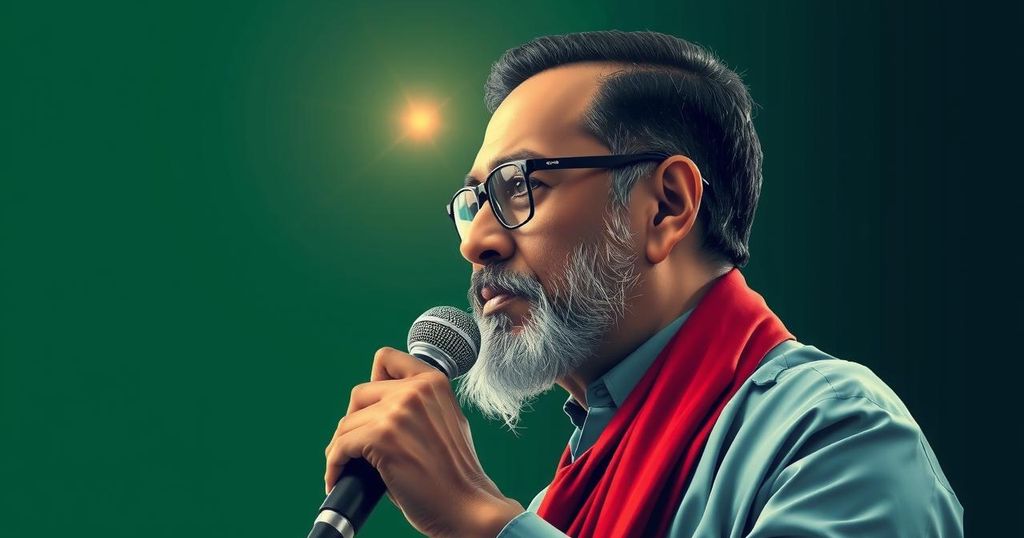Mohammad Yunus: Guiding Bangladesh Towards a Democratic Future
The interim government led by Nobel laureate Mohammad Yunus presents a critical opportunity for Bangladesh to forge a new democratic path following the recent political upheaval. Drawing from historical experiences of other nations, Yunus must prioritize reforms that safeguard civil society and promote democracy while avoiding pitfalls observed in past transitions. Success could position him as a prominent figure in South Asia, offering a model for civic revitalization, whereas failure may perpetuate cycles of authoritarianism.
Mohammad Yunus stands at the helm of Bangladesh’s interim government following a significant political upheaval, offering a historic opportunity to shape the nation’s democratic future. With a legacy as a Nobel laureate and civil society advocate, Yunus is tasked with stewarding the country towards a truly democratic framework after the authoritarian era marked by Sheikh Hasina’s regime. To transform the political landscape, he must learn from both the achievements and pitfalls evident in other nations’ transitions from authoritarian rule.
Currently, Bangladesh’s interim leadership possesses a unique chance to establish a proactive relationship with civil society, potentially enabling social cohesion and accountability regarding past atrocities. Strategies such as dismantling security units linked to human rights violations, reforming the NGO Affairs Bureau, and revising restrictive laws regarding foreign donations would be vital steps towards nurturing civic space. Yunus must act swiftly, as moments of transformative potential can dissipate quickly.
Historical precedents convey a cautionary tale; without a clear vision following the toppling of dictators, democratic institutions can be compromised by elite manipulation. Countries like Sudan and Pakistan exemplify how pro-democratic elements can become ensnared by military powers or return to widespread repression. Conversely, examples from Sri Lanka, Chile, and Guatemala showcase how civic movements can yield positive democratic progress, even amid resistance from established powers.
Bangladesh must heed these lessons, acknowledging both victories and setbacks from similar democratic trajectories. Immediate and meaningful reforms may not materialize overnight, especially in light of protracted authoritarian governance, yet the potential for substantial improvement remains within reach.
As Professor Yunus endeavors to navigate this complex juncture, he must prioritize sustained dialogue with civil society collaborators, ensuring that his government remains aligned with democratic principles. A misstep in this journey, characterized by the suppression of dissent or the marginalization of civic voices, risks reverting to a historical narrative of tyranny. Generic authoritarianism could overshadow the revolutionary spirit that unseated Prime Minister Hasina.
Should he succeed in establishing foundational democratic processes, Yunus could emerge as a transformative figure akin to Nelson Mandela in the South Asian context, serving as a beacon of hope for nations striving for civil liberties. The international community remains poised to offer critical support to this transitional government, underpinning Yunus’s mission.
The article revolves around the political climate in Bangladesh after the resignation of long-serving Prime Minister Sheikh Hasina, which was preceded by massive public protests. Mohammad Yunus, a celebrated economist and Nobel laureate, now leads an interim government that includes civil society representatives. The article emphasizes the significant opportunity for Yunus and his government to reinvent Bangladesh’s democratic landscape, drawing from historical lessons and experiences from other countries that have undergone similar transitions.
In conclusion, the trajectory of Bangladesh’s democracy is intricately linked to the actions taken by Professor Mohammad Yunus and his interim government. By embracing the insights drawn from other nations’ experiences, prioritizing civil society engagement, and implementing necessary reforms, Yunus has the potential to catalyze meaningful change. However, the risk of reverting to repressive governance looms large, underscoring the importance of steadfast dedication to democratic values and human rights for the new leadership.
Original Source: www.aljazeera.com








Post Comment